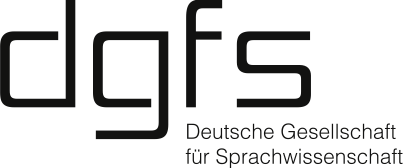AG 6: The prosody and meaning of (non-)canonical questions across languages
Session organizers
Daniela Wochner, Nicole Dehé, Bettina Braun (U Konstanz) & Beste Kamali, Hubert Truckenbrodt (ZAS Berlin)
Abstract
There has been a recent spur of research aiming to understand interrogatives from multiple perspectives including prosody, semantics, and pragmatics. In bringing together research on canonical and non-canonical questions, we aim to provide a forum where cutting edge theoretical approaches meet highly detailed empirical assessment.
For canonical questions, the workshop is particularly interested in the relation between questions and focus in the different modules of grammar, and in the role of the intonation contour in different questioning types. Where do questions show question-specific stress- or phrasing patterns? Where do wh-phrases show similarities to focused phrases? Why do the alternatives in alternative questions show focus prosody? Intervention effects are an important topic in the interaction between focus and wh-phrases and/or alternatives in alternative questions. Are there other interactions as well? What question-specific intonation contours or question-specific assignment of intonation contours do different languages show, and how is the variation to be understood?
The non-canonical questions that the workshop is interested in include those which (i) besides being used as requests for information, have further pragmatic dimensions; (ii) have non-interrogative syntax; and/or (iii) may be identified as non-canonical through their prosody, or any combination of these properties. Example types are declarative questions, tag questions, and rhetorical questions. We would like to see if various well-known –but not uncontroversial- properties of non-canonical questions stand up to closer scrutiny: Are declarative questions and tags always confirmation-seeking rather than information-seeking? Do declarative questions always have rising intonation and why? How to approach the illocutionary force of assertion in rhetorical questions and to what extent can their prosody inform us? How do modal particles such as schon in German contribute to the rhetorical question pragmatics?
This workshop is of interest to a broad audience working on syntax, semantics, prosody, and their interfaces, with a focus on interrogatives and related phenomena.
Program
| 4.3.2015 | |||
| 14:00 | Daniela Wochner & Jana Schlegel (Konstanz) | ||
| The prosody of rhetorical questions | |||
| 14:30 | Meghan Armstrong (UMASS Amherst) | ||
| The early rise-fall as a marker of positive epistemic bias in American English | |||
| 15:00 | Kambiz Elhami (Université Blaise Pascal) | ||
| Reversed polarity questions (RPQs) in American films: corpus based study of relationships of prosodic features and discourse-pragmatic values | |||
| 15:30 | Olga Kellert (Göttingen) | ||
| The contribution of particles to the rhetorical question interpretation: a case study of Italian particles mai/cazzo/cavolo | |||
| 16:00 | Break | ||
| 16:30 | Jan Michalsky & Jörg Peters (Oldenburg) | ||
| Pitch scaling as a marker of interrogativity in canonical questions of German | |||
| 17:00 | Martina Wiltschko & Johannes Heim (UBC Vancouver) | ||
| Requesting confirmation with intonation and sentence-peripheral discourse markers | |||
| 17:30 | Nancy Hedberg (Simon Fraser University) | ||
| Non-canonical question intonation in American English | |||
| 5.3.2015 | |||
| 9:00 | Hubert Truckenbrodt & Beste Kamali (ZAS Berlin) | ||
| On wh and F in German and Turkish | |||
| 9:30 | Diana Forker (Bamberg) | ||
| Question, focus and modality in Nakh-Daghestanian:the case of Sanzhi Dargwa | |||
| 10:00 | Miriam Butt, Tina Bögel & Farhat Jabeen (Konstanz) | ||
| Immediately postverbal questions in Urdu/Hindi | |||
| 10:30 | Peter Öhl (Bergische Universität Wuppertal) | ||
| Interaction of scope and modality: wh-words, negation and interrogativity in English, German and Persian | |||
| 11:00 | Break | ||
| 11:30 | Daniel Gutzmann (Frankfurt) & Robert Henderson (Wayne State U) | ||
| Expressive questions, much? | |||
| 12:00 | Sigrid Beck (Tübingen) | ||
| Interpretation of echo-questions | |||
| 6.3.2015 | |||
| 11:30 | Frank Kügler (Potsdam) | ||
| Focal lowering in German interrogatives | |||
| 12:00 | Tatjana Scheffler (Potsdam) | ||
| Meaning variations in German tag questions | |||
| 12:30 | Dina El Zarka & Anna Gazdik (Karl-Franzens-U Graz) | ||
| Question words as topics and foci in Hungarian multiple questions | |||
| 13:00 | Jane Kühn (Potsdam) | ||
| The prosody of information structure in monolingual and bilingual Turkish yes/no questions | |||
| 13:30 | Final discussion |

